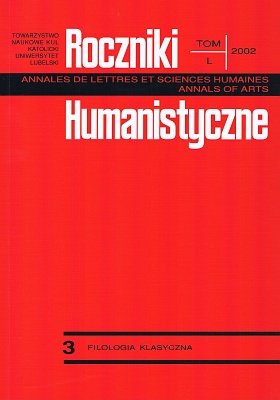„Idem sacra cano...”. The Poet and Princeps in Ovid's Fasti
Abstract
We have recently witnessed an increase in the interest of Ovid's Fasti (Calendar). Despite that there is still a discrepancy in the understanding of the passages concerning the princeps. In the light of his poetry in exile they were regarded as panegyric, whereas the poet himself here and there refers clearly to his erotic writing. Augustus was fully aware about treating his actions as a kind of breakthrough, and he instrumentally treated the national calendar and the events, especially political, that were mentioned in it. Addressing his work as his own commentary to the princeps, Ovid seems to be unveiling his manipulations as regards the time, the place and the worship. He keeps an ironical distance towards the Augustan ideology which is manifested also in using many times the metaphor and phraseology approved by the official poets - Virgil and Horace. It is therefore a „foreign speech,” sometimes exposed in a hyperbolical or humorous manner. The poet does not leave his earlier ludic attitude, and declares loyalty to Venery, the hitherto patroness, despite the new theme: „ideam sacra cano.” Similarly, he perceives the person of the princeps. In the Fasti first of all the tone of an ironist sounds, the one who seemingly glories „nomina et titulos principis.” This tone of the work may be revealed by such reading that does not stop on the surface of its literal understanding.
References
Barchiesi A.: Il poeta e il principe. Ovidio e il discorso augusteo. Roma−Bari 1994.
Barsby J.: Ovid. Greece and Rome Survey in Classics 12. Oxford 1978.
Bömer F.: Publius Ovidius Naso. Die Fasten. Hrsg., übersetzt und kommentiert von ... Heidelberg 1958. Bd. II.
Croon J. H.: Die Ideologie des Marskultes unter dem Prinzipat und ihre Vorgeschichte. ANRW 2,17,1. Berlin 1981.
D'Elia S.: Die Ironie in Ovids Fasten. W: Ovid. Hrsg. von M. v. Albrecht und E. Zinn. Darmstadt 1968.
Eco U.: Interpretacja i nadinterpretacja. Przeł. T. Bieroń. Kraków 1996.
Frécaut J. M.: L'esprit et humour chez Ovide. Grenoble 1972.
Gagé J.: Res gestae divi Augusti. Texte établi et commenté par ... Paris 1935.
Hinds S.: Arma in Ovid's Fasti. Part 2. Genre, Romulean Rome and Augustan Ideology. „Arethusa” 25:1992.
Johnson W. R.: The Desolation of the Fasti. „Classical Journal” 74:1978.
McKeown J. C.: Fabula proposito nulla tegenda meo. W: Poetry and Politics in the Age of Augustus. Ed. by J. Woodman and D. A. West. Cambridge 1984.
Miller J. F.: Introduction: Research on Ovids Fasti. „Arethusa” 25:1992.
Miller J. F.: Ovidian Allusion and the Vocabulary of Memory. „Materiali e discussioni...” 30:1993.
Newlands C.: Narrator in the Fasti. „Arethusa” 25:1992.
Newlands C.: Playing with Time. Ovid and the Fasti. New York 1995.
Paratore E.: De Fastorum prooemio Germanicique nuncupatione. „Latinitas” 20:1972.
Pietrusiński D.: L'apothéose d'Octavien Auguste par la parallèle avec Juppiter dans la poésie d'Horace. „Eos” 68: 1980.
Pietrusiński D.: L'apothéose d'Auquste par rapport à Romulus-Quirinus dans la poésie de Virgile et d'Horace. „Eos” 63:1975.
Stabryła S.: Owidiusz. Świat poetycki. Wrocław 1987.
Wilkinson L. P.: Ovid Recalled. Cambridge 1955.
Williams G.: Change and Decline: Roman Literature in the Early Empire. Berkeley−Los Angeles−London 1978.
Zarzycka-Stańczak K.: Idem aliter. Przybliżenia owidiańskie. Lublin 1999.
Copyright (c) 2002 Roczniki Humanistyczne

This work is licensed under a Creative Commons Attribution-NonCommercial-NoDerivatives 4.0 International License.





